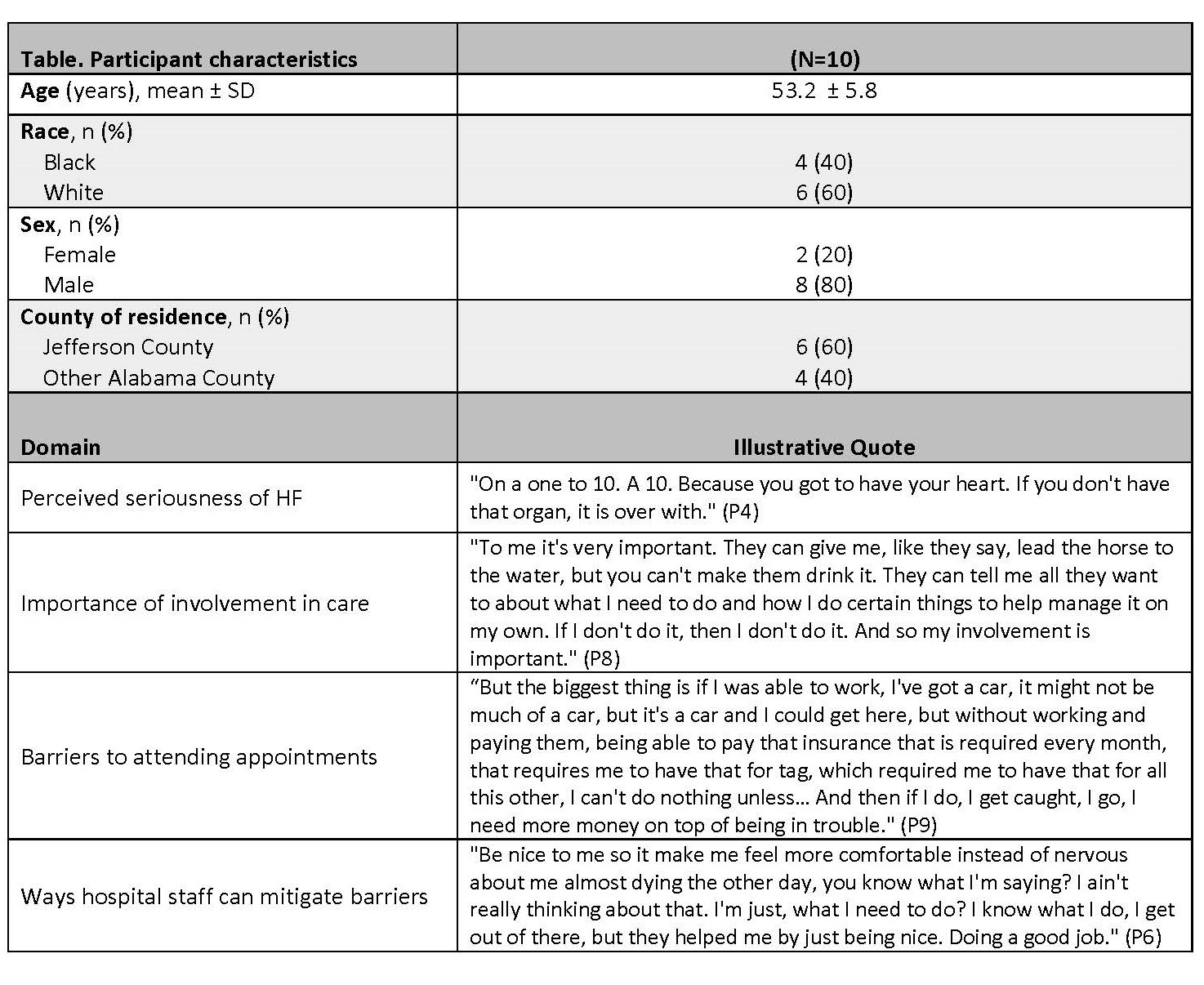Final ID: P1094
Patient-Specific Barriers to Establishing Outpatient Heart Failure Care Following Hospitalization
Abstract Body: Background: Heart failure (HF) is a complex chronic disease that requires long-term outpatient care. Patients with a high burden of adverse social determinants of health have fewer opportunities for this care. When these patients attend an inter-professional HF clinic specifically designed to care for underserved patients they experience fewer hospital readmissions, however, about 30% of patients will be unable to present to clinic.
Methods: Through qualitative interviews guided by the Health Belief Model, we sought to identify patient-specific barriers to successful linkage in outpatient care. We asked patients to describe perceived seriousness of HF, importance of their involvement in their care, barriers to attending appointments, and ways to mitigate barriers.
Results: We interviewed 10 patients newly referred to the UAB HF clinic during an inpatient HF hospitalization at UAB Hospital. Participants were 53 years old, white, male, and residing in Jefferson County, AL (Table). Patients viewed HF as a serious condition due to the necessity of heart function. They valued information received from doctors, but most emphasized the importance of their involvement in their care, stressing patient responsibility to implement the doctor’s guidance. Barriers to attending appointments were transportation and monetary concerns. Patients reported that rides to and from their appointments would be helpful in addressing their reported barriers. Patients noted the importance of a welcoming environment while hospitalized to encourage appointment attendance following hospital discharge.
Conclusion: Patients with HF perceive HF as serious and recognize the importance of their involvement in their care. Inadequate transportation and monetary concerns were reasons they might not attend outpatient appointments, highlighting potential barriers to be addressed. In addition to rides, experiencing a welcoming environment while hospitalized would most help them to attend appointments post-discharge.
Methods: Through qualitative interviews guided by the Health Belief Model, we sought to identify patient-specific barriers to successful linkage in outpatient care. We asked patients to describe perceived seriousness of HF, importance of their involvement in their care, barriers to attending appointments, and ways to mitigate barriers.
Results: We interviewed 10 patients newly referred to the UAB HF clinic during an inpatient HF hospitalization at UAB Hospital. Participants were 53 years old, white, male, and residing in Jefferson County, AL (Table). Patients viewed HF as a serious condition due to the necessity of heart function. They valued information received from doctors, but most emphasized the importance of their involvement in their care, stressing patient responsibility to implement the doctor’s guidance. Barriers to attending appointments were transportation and monetary concerns. Patients reported that rides to and from their appointments would be helpful in addressing their reported barriers. Patients noted the importance of a welcoming environment while hospitalized to encourage appointment attendance following hospital discharge.
Conclusion: Patients with HF perceive HF as serious and recognize the importance of their involvement in their care. Inadequate transportation and monetary concerns were reasons they might not attend outpatient appointments, highlighting potential barriers to be addressed. In addition to rides, experiencing a welcoming environment while hospitalized would most help them to attend appointments post-discharge.
More abstracts on this topic:
A Growing Burden of Electronic Medical Record Messages in ACHD Care
Dailey Schwartz Andrew, Alegria Jorge
A Comparative Study Of Social Determinants, Hypertension, And Life Essential Factors In Alabama And Colorado From The 2021 Behavioral Risk Factor Surveillance SystemChukwunyere Chibuike, Owuor Kevin

